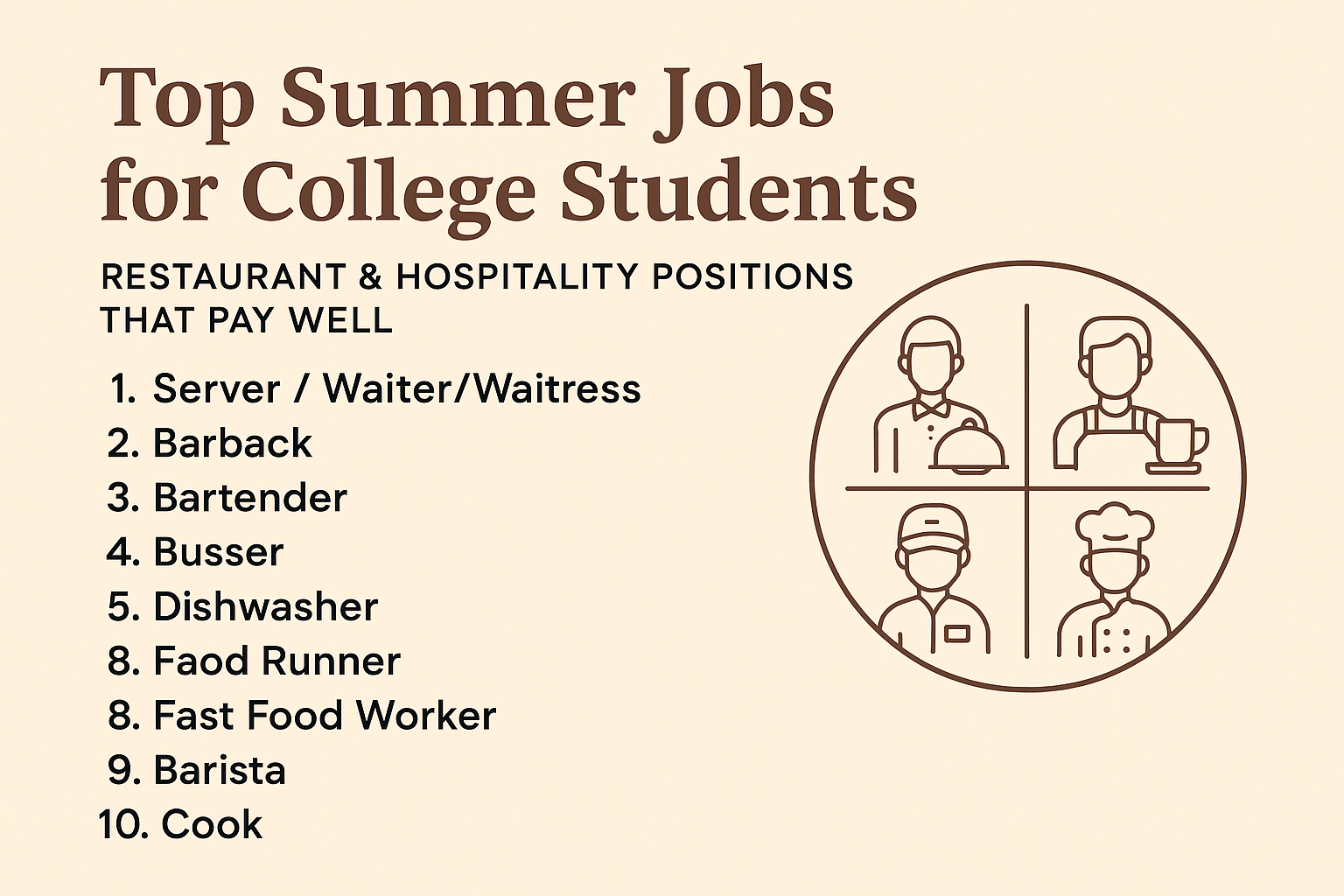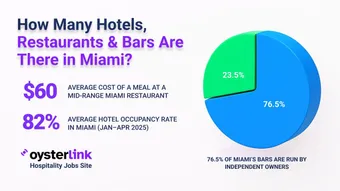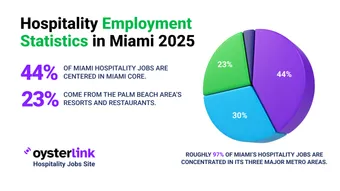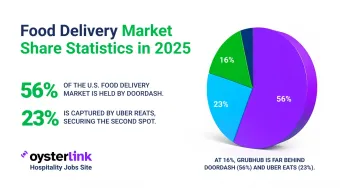Summer Jobs for College Students Key Takeaways:
- Summer jobs in the restaurant and hospitality industry are ideal for college students seeking good pay without extensive prior experience.
- Positions like Server, Bartender, and Receptionist typically earn between $12 and $20+ per hour, often boosted by tips.
- Many roles require minimal formal training and offer valuable experience in customer service, teamwork, and multitasking.
- Flexible scheduling makes these jobs ideal for balancing work, summer courses, and leisure activities.
Summer break offers college students a great chance to earn extra income, build skills, and gain work experience before heading back to classes. Working a seasonal job helps pay tuition, develop a professional network, and strengthen a resume.
In fact, more than half of young Americans work during the summer, and many find jobs that improve their communication, teamwork, and responsibility.
The restaurant and hospitality industry is a prime sector for summer jobs, since restaurants typcailly hire over half a million seasonal workers (525,000 seasonal workers in 2024). Over one-third of teenagers employed last summer worked in food service or lodging, underscoring how many opportunities this industry offers.
Best of all, restaurant jobs typically require little or no prior experience (with on-the-job training instead) while paying well (often boosted by customer tips).
Top 10 Summer Jobs for College Students
The following are ten common restaurant and hospitality roles perfect for college students, each with a description, pay range, entry requirements and hiring tips.

1. Server/Waitstaff
Servers and Waitstaff take orders and serve food and beverages in restaurants, diners, and hotels. They greet guests, explain menus, take orders, deliver meals, and process payments.
Serving often means fast-paced work on your feet, sometimes with split shifts or evenings and weekends. No formal education is needed – most Servers learn in a few days of on-the-job training – though many employers prefer a high school diploma or equivalent.
In most states, Servers must be 18+ to serve alcohol. The median wage for Waiters/Waitresses is about $17.56 per hour(not counting tips), but experienced Servers often earn well above that when tips are included.
- Typical Pay: ~$16–20 per hour on average (median ~$17.53), plus tips.
- Requirements: Usually no prior experience; on-the-job training. Must meet age minimum for alcoholic service (often 18+).
- Tips for Success: Provide friendly, attentive service; memorize the menu and specials; multitask efficiently; build rapport with customers. Good Servers are polite, organized (e.g. carrying trays steadily), and can upsell specials or suggest add-ons to increase tips.
2. Barback
Barbacks are Bartender assistants. They work behind the scenes stocking the bar, fetching ice and drinks, cleaning glasses, and clearing tables so Bartenders can focus on customers.
This is often an entry-level position that requires stamina and speed. Barbacks usually start at a base wage similar to Bussers – typically around $10–$15 per hour – but often earn $15.23 on average (plus any tip-outs from the Bartender).
No formal training is needed, but you must be old enough (usually 18+) to work in a bar environment. Barbacks also learn from bartenders and need a basic understanding of popular drinks.
- Typical Pay: ~$15.23 per hour (average), plus tips (often shared with Bartenders).
- Requirements: Generally none beyond age minimum (usually 18) and on-the-job training. Good candidates are hard-working and able to lift heavy cases and kegs.
- Tips for Success: Stay organized (keep the bar fully stocked and clean); work quickly and predict bartender needs; maintain a positive attitude during busy rushes. Good Barbacks anticipate needs (like extra ice or napkins) and support the bar team reliably.
3. Bartender
Bartenders mix and serve drinks at bars, restaurants, hotels, and clubs. They take drink orders, prepare beverages from recipes (from basic beers to cocktails), handle cash, and interact directly with guests.
Bartending is a popular role for college students who enjoy a dynamic environment. Bartenders earn a median of $17.83 per hour (including base pay; actual take-home is higher with tips). No college degree or prior experience is required; most Bartenders learn on the job.
However, nearly all states require Bartenders to be at least 18 years old to serve alcohol. In some states, completing a short alcohol-server training (e.g. RBS/TIPS certification) is mandatory.
- Typical Pay: ~$17.83 per hour median, but total earnings often exceed $20–$25/h with tips.
- Requirements/Certifications: Must meet legal drinking age (18+ in most states); some places require alcohol safety certification (Responsible Beverage Service training). No formal education needed beyond high school.
- Tips for Success: Learn popular drink recipes and drink-making techniques; stay courteous and attentive to customers; keep the bar area clean; check IDs for underage customers. Being able to multi-task during a rush and engage patrons can increase tips and job satisfaction.

4. Busser
Bussers (sometimes called busboys or busgirls) support the front-of-house staff by clearing tables, refilling water, and resetting plates between customers.
They help Servers by keeping dining areas clean and ready. This is often an entry-level role with minimal requirements. Bussers earn about $14.44 per hour on average (often combined with pooled tips), with most positions starting around minimum wage.
No formal training or education is needed – Bussers usually learn duties like clearing dishes through a brief orientation. Physical stamina and a team-oriented attitude are key.
- Typical Pay: ~$14.44 per hour on average (range ~$9–22, depends on location and tip pool).
- Requirements: None formal; on-the-job training. Ability to handle physical work (lifting trays, standing long hours).
- Tips for Success: Be fast and thorough when clearing tables and refilling items; communicate well with Servers; pay attention to cleanliness and restaurant flow. A great Busser is proactive (e.g. knowing when to reset a table) and reliable under a busy lunch or dinner service.
5. Dishwasher
Dishwashers work behind the scenes in the kitchen, washing dishes, cookware, and utensils, and helping maintain overall kitchen sanitation. It’s a critical role for any restaurant and usually the lowest barrier to entry. The average wage for Dishwashers is about $15.22 per hour in 2025 data (rising recently).
Typically no experience or education is required; most Dishwashers start at minimum wage and learn on the job. Dishwashers rarely handle knives or direct cooking, but must be able to work in hot, wet conditions.
- Typical Pay: ~$15.22 per hour on average (range ~$11–18/hr).
- Requirements: No formal requirements; must be able to stand for hours, work with cleaning chemicals, and follow safety procedures. Many workplaces pair this job with part-time or full-time shifts.
- Tips for Success: Be dependable (restaurants depend on clean dishes at all times); work quickly and keep sinks/stations organized; observe food safety rules; help with basic kitchen prep when downtime permits. A strong Dishwasher can move up to roles like Prep Cook or Line Cook over time.
6. Receptionist (Host/Hostess)
Receptionists or Hosts greet guests, answer phones, and manage reservations or check-ins. In hospitality settings (hotels, restaurants, spas), a Receptionist ensures customers feel welcome and get correct information.
This role requires good communication and organizational skills. Receptionists typically need a high school diploma or equivalent. Pay is decent: the median Receptionist wage is about $17.59 per hour. Many receptionists earn around $15–$20/hr depending on industry and location.
- Typical Pay: ~$17.59 per hour (median) (often supplemented by tips in restaurants, or benefits in hotels).
- Requirements: High school diploma or GED; customer-service skills and basic computer literacy (reservation/point-of-sale systems) are important. Receptionists may be trained briefly on company software.
- Tips for Success: Maintain a friendly, professional demeanor; keep desk or lobby tidy; multi-task (answer calls while greeting walk-ins); be helpful with information (menu, directions, etc.). Strong receptionists are punctual, polite, and adept at problem-solving or redirecting issues to managers.

7. Food Runner
Food Runners act as expediters between the kitchen and dining room. They pick up completed dishes from Cooks and deliver them quickly to the correct tables, helping Servers ensure orders arrive while hot.
Food runners typically earn wages similar to Bussers – often in the $12–$15 per hour range (plus any shared tips). This job requires no formal education; on-the-job guidance covers the menu and table layouts.
- Typical Pay: ~$12–$15 per hour (often plus tips).
- Requirements: No formal credentials; must learn restaurant’s layout and order systems. A strong food runner is attentive (double-checking orders before leaving kitchen), quick on their feet, and has good balance carrying multiple plates.
- Tips for Success: Learn every menu item’s appearance (to ensure order accuracy); communicate clearly with servers and kitchen; keep food warm (cover trays if needed). Efficiency and clear communication help this role shine.
8. Fast Food Worker
Fast-food or quick-service workers handle order taking, food prep, and customer service in chain restaurants and cafes. Common duties include cashiering, assembling burgers/sandwiches, and bagging orders.
These jobs are abundant for students and often offer flexible scheduling. On average, fast-food employees earn about $14.47 per hour, though some chains pay higher. Training is provided by the employer; many workers start at 16–18 years old.
- Typical Pay: ~$14.47 per hour (national average); some locations and roles (like shift leader) earn more.
- Requirements: Usually age 16+; short orientation/training (cash register use, food safety). Physical stamina and basic math are helpful.
- Tips for Success: Be quick and accurate when taking and preparing orders; maintain a clean workstation; engage courteously with customers. Most fast-food chains promote from within, so showing enthusiasm and teamwork can lead to raises or supervisory positions.
9. Barista
Baristas prepare coffee, tea, and light food items in cafes and coffee shops. They must master drink recipes (espresso, lattes, specialty drinks) and often handle cash and loyalty programs.
Good baristas have great customer service and some artistic flair (latte art). Baristas make about $16.74 per hour on average, with ranges ~$14–$18 depending on location. Many cafes will train new Baristas on equipment.
- Typical Pay: ~$16.74 per hour (national average).
- Requirements: No formal education required; employers train on the job. Some chains may prefer 18+ (for more complex shifts). Food handler certification is a plus if handling prepared foods.
- Tips for Success: Learn the café menu well (knowing ingredients helps with suggestions); practice making drinks consistently and quickly; keep a neat workspace. Building rapport (smiling, remembering regulars’ names or orders) can boost tips and repeat business. Bonus: mastering latte art or new coffee trends makes you stand out.

10. Cook
Cooks work in the kitchen preparing the restaurant’s food. They chop, season, and cook ingredients to make entrees, sides, and desserts. There are many types of cooks (short-order, line cook, prep cook), but most entry-level Cooks learn on the job from a Chef.
A high school diploma is often all that’s needed, though culinary training can help. The median Cook’s wage is about $17.34 per hour. Pay varies by kitchen type (diners vs. fancy restaurants) and experience.
- Typical Pay: ~$17.34 per hour (median). Entry-level Cooks often start near $12–$15, with plenty of opportunity to increase pay with experience.
- Requirements: No formal degree required; on-the-job training is standard. Some kitchens require a food handler safety certificate. Punctuality and kitchen safety (handling knives and hot surfaces properly) are critical.
- Tips for Success: Keep your station organized and clean (mise en place makes cooking faster); learn basic cooking techniques (grilling, sautéing, knife skills); communicate well with Chefs and Line Cooks (to know when dishes are ready). Good Cooks work quickly during peak hours, maintain consistent food quality, and continuously improve recipes and plating.
Summer Jobs for College Students Final Thoughts
Each of these roles offers flexible schedules and a chance to earn good money during the summer. Even without prior experience, college students can succeed by being reliable, learning fast on the job, and providing excellent service.
These summer jobs not only pay well (thanks to base wages and tips in many cases) but also build important skills – from teamwork to customer relations – that look great on any resume.





